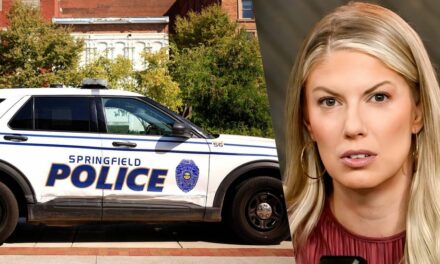We support our Publishers and Content Creators. You can view this story on their website by CLICKING HERE.

College students across the state of Arizona received a text message from the Harris campaign, prompting questions about student privacy and possible violations of federal law.
On Sunday, the College Republicans of Arizona State University took to social media to share a text message that many students on campus apparently received. The message, signed by Kamala Harris, encouraged students to register to vote.
“Tim Walz and I are the underdogs in this election,” said the message from Harris, who has been vice president for nearly four years. “We need your support to win.”
“Your vote is your voice and your power,” the message continued, according to a screenshot. “You must not let anybody take your power from you.”
The ASU CRs appeared to be incensed by the text, claiming it may amount to “election interference.” They also indicated that the Harris team accessed student information that should otherwise be “confidential.”
Republican state Sen. Jake Hoffman was likewise concerned that laws may have been broken and accused Harris of “exploit[ing] private student data” to benefit her campaign.
“It is ILLEGAL for political campaigns to access personally identifiable information (PII) of public university students within AZ,” Hoffman continued. “This is a MAJOR security breach!”
Hoffman then called for “a full [state] Senate investigation immediately.”
‘Under federal law, directory information is not considered private unless students opt to withhold it from public disclosure.’
The law in question is called the Family Education Rights and Privacy Act, better known as FERPA, and it regulates the information to which students’ family members are entitled, especially once the students become legal adults.
So far, all three affected Arizona schools — Arizona State University, Northern Arizona University, and the University of Arizona — have stated emphatically that the information is a matter of public record unless a student deliberately chooses to “withhold” it and that the Harris campaign did not violate FERPA in accessing it.
The following are statements that these schools submitted to the New York Post:
A representative from ASU said:
The contact information of enrolled students (including their cell phone numbers) is a matter of public record. This is not ASU policy. Under FERPA, it is considered ‘directory information,’ along with other basic information like the student’s major, dates of attendance and enrollment status. It is common for entities that want to advertise to ASU students to request this publicly available contact information — everything from apartment complexes, to credit cards, to political candidates.
A spokesperson from NAU wrote in an email: “We receive these types of requests many times throughout the year and the requestor must pay for data they ask for.”
A UA spokesperson added:
Organizations can request directory information through the University of Arizona Office of Public Records. Under federal law, directory information is not considered private unless students opt to withhold it from public disclosure. Students can make this election at any time through their online student portal.
The UA spokesperson also denied that the Harris campaign had been the party that requested the information. The Post indicated that such “directory information” may have been given to a third party.
In response to social media chatter about possible FERPA violations, Democratic strategist Tony Cani became snarky.
“I know Republicans in AZ are ages behind when it comes to modern campaigning, but their ignorance doesn’t excuse this absolute lie that a text message like this asking students to register to vote is 1) election interference and 2) somehow against the law,” he wrote.
Cani also suggested that Republicans may simply be laying the groundwork for contesting another election. “Instead of doing the work themselves to reach potential voters, the Trump world is … playing victim so if they lose, they can … spread conspiracy theories that claim the election was stolen,” he added.
The ASU College Republicans did not respond to a request for comment from Blaze News.
Like Blaze News? Bypass the censors, sign up for our newsletters, and get stories like this direct to your inbox. Sign up here!

 Conservative
Conservative  Search
Search Trending
Trending Current News
Current News 







